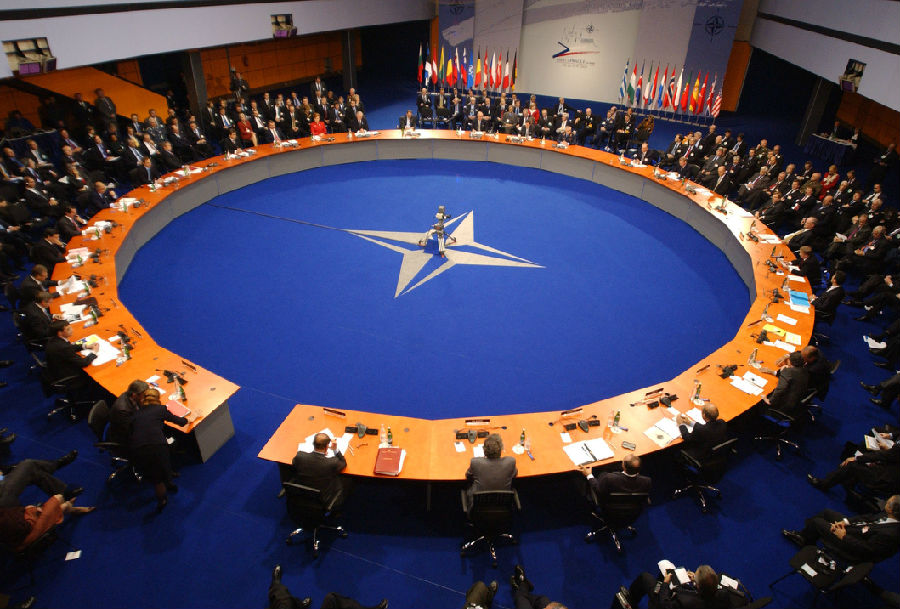Is NATO Trump’s next target?
北約是特朗普接下來(lái)的目標(biāo)嗎?
By Charlotte McDonald-Gibson/Brussels
文/(布魯塞爾)夏洛特· 麥克唐納-吉布森
THE PREFERRED TERM FOR THE 29 COUNTRIES of the North Atlantic Treaty Organization is not members or signatories but allies.
北大西洋公約組織(NATO)名下29個(gè)國(guó)家的首選成為不是成員國(guó),也不是簽署國(guó),而是盟國(guó)。
Yet as a July 11–12 NATO summit approaches,
7月11日至12日的北約峰會(huì)日漸臨近,
28 of those nations’ leaders would be forgiven for questioning whether that word still applies to the leader of the 29th.
其中28個(gè)國(guó)家的領(lǐng)導(dǎo)人都在質(zhì)疑這一稱謂是否仍對(duì)剩余那一個(gè)國(guó)家有效,然而,他們有此擔(dān)憂也無(wú)可厚非。
In the space of two weeks in June,
今年六月,在短短兩周之內(nèi),
U.S. President Donald Trump baited the E.U. and Canada into a trade war;
美國(guó)總統(tǒng)特朗普不僅挑起了歐盟和加拿大的貿(mào)易戰(zhàn),
argued that Russian President Vladimir Putin—still under E.U. and U.S. sanctions for the annexation of Crimea—should be invited back into the G-7;
聲稱七國(guó)集團(tuán)應(yīng)該邀請(qǐng)俄羅斯總統(tǒng)普京——吞并了克里米亞的普京目前仍在歐盟和美國(guó)的制裁之下——回到集團(tuán);
and branded Canadian Prime Minister Justin Trudeau as “dishonest” and “weak.”
還指責(zé)加拿大總理賈斯汀·特魯多“不誠(chéng)實(shí)”、“軟弱”。
He then met with North Korean dictator Kim Jong Un, calling him a “very talented” leader.
隨后,他會(huì)見(jiàn)了朝鮮獨(dú)裁者金正恩,稱他是一位“非常有才華的”領(lǐng)導(dǎo)人。
More recently, National Security Adviser John Bolton was dispatched to Moscow to meet the Russian President, ahead of a Trump-Putin summit in mid-July.
最近,國(guó)家安全顧問(wèn)約翰·博爾頓被派往莫斯科,在7月中旬特朗普與普京舉行峰會(huì)之前先行與普京會(huì)面。
That could strengthen bilateral ties between the U.S. and Russia—and make allies even more anxious.
此舉既能鞏固美國(guó)和俄羅斯的雙邊關(guān)系,也會(huì)使盟國(guó)陷入更深的焦慮。
“The friends and allies of the United States (were left) wondering, who is the leader of the democratic world?”
“美國(guó)的朋友和盟國(guó)都在琢磨,到底誰(shuí)才是民主世界的領(lǐng)袖?”

Anders Fogh Rasmussen, the previous Secretary-General of NATO, tells TIME.
北約前秘書長(zhǎng)安諾斯·福格·拉斯穆森告訴《時(shí)代》周刊。
Many in Brussels are now concerned that NATO, the alliance that has preserved global stability since 1949,
在布魯塞爾,許多人都在擔(dān)心,面對(duì)總統(tǒng)顛覆現(xiàn)有國(guó)際秩序的企圖,
might be the next foundation block to go as the President tries to uproot the old world order.
1949年以來(lái)一直維持著全球穩(wěn)定的北約組織或?qū)⒊蔀橄乱粋€(gè)被撤走的基石。
“It would be no less than a disaster,” says Rasmussen. “Not only for the Western democratic world but for the democratic world globally.”
“無(wú)論是對(duì)西方民主社會(huì),還是整個(gè)民主社會(huì)而言,”拉斯穆森說(shuō)。“那都無(wú)異于是一場(chǎng)災(zāi)難。”
NATO HAS LONG PLAYED a key role in Trump’s narrative that the U.S. foots the bill for the rest of the world at the expense of its own citizens.
特朗普反復(fù)揚(yáng)言,美國(guó)是在花自己公民的錢給其他國(guó)家買單,在他的這一講述中,北約一直扮演了關(guān)鍵的角色。
He once again lambasted NATO allies’ contributions during a speech on June 25 in South Carolina
6月25日,在南卡羅萊納州的一次演講上,他再次抨擊了北約盟國(guó)出力不夠一事,
by falsely claiming that the U.S. was responsible for 90% of spending.
謊稱美國(guó)承擔(dān)了北約90%的支出。
In fact, the U.S. provides 22% of the NATO alliance’s common funding—
事實(shí)上,美國(guó)只承擔(dān)了22%的北約聯(lián)盟共同基金——
which covers NATO’s running costs, the military budget and some capabilities like aerial surveillance.
該基金負(fù)責(zé)填補(bǔ)北約的運(yùn)營(yíng)成本、軍事預(yù)算以及空中監(jiān)視之類的能力等各項(xiàng)支出。
Under pressure from Washington—and reacting to Russian aggression—
面對(duì)華盛頓的施壓——以及俄羅斯的氣焰——
NATO members agreed in 2014 to each increase defense spending to 2% of GDP by 2024.
2014年,北約各盟國(guó)同意,在2024年之前,將國(guó)防開(kāi)支比例上調(diào)至GDP的2%。
So far, only eight NATO countries have met that target, Rasmussen says.
截至目前,僅有8個(gè)國(guó)家完成了這一任務(wù),拉斯穆森說(shuō)。
While many Europeans agree with Trump’s general point about defense spending, his approach is exasperating allies.
盡管許多歐洲人都贊成特朗普在國(guó)防開(kāi)支方面的總體觀點(diǎn),他的做法卻激怒了許多盟友。
One day after the G-7 summit, Trump launched a Twitter tirade aimed at Europe,
因?yàn)槠邍?guó)集團(tuán)峰會(huì)閉幕的一天后,特朗普就在推特上發(fā)表了針對(duì)歐洲的長(zhǎng)篇大論,
lamenting that the U.S. spends money “protecting many of these same countries that rip us off on Trade” and warning that “change is coming.”
悲嘆美國(guó)是在花錢“保護(hù)那些在貿(mào)易上剝削我們的國(guó)家”,還警告說(shuō)“改變即將到來(lái)”。



